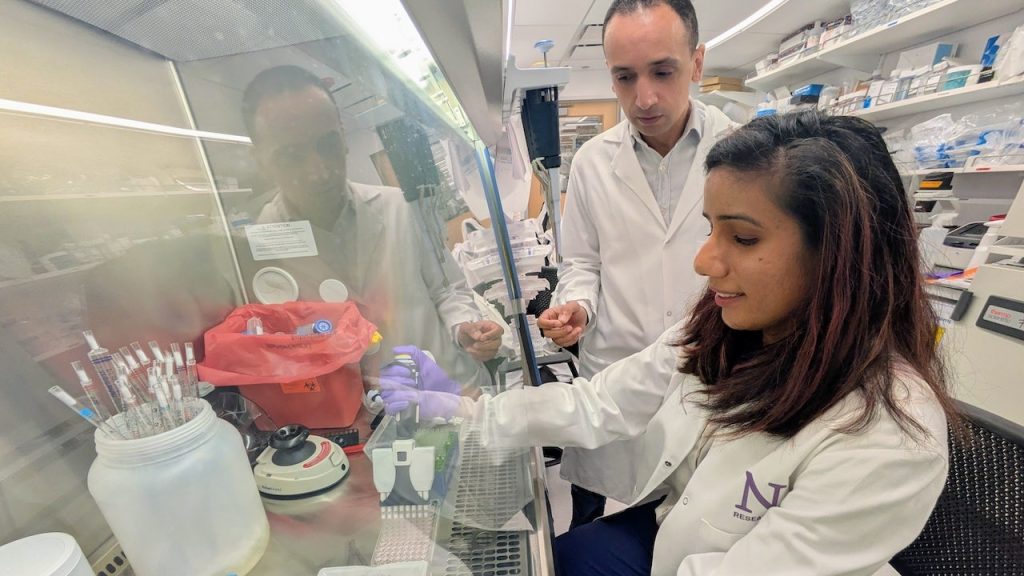Listen to the article
Breakthrough Antibody Treatment Unmasks Pancreatic Cancer for Immune Attack
Scientists at Northwestern University have developed a novel antibody treatment that helps the immune system recognize and attack pancreatic cancer by targeting the sugary “disguise” these cancer cells use to evade detection.
Unlike conventional cancer immunotherapies that target proteins or genes, this innovative approach focuses on blocking sialic acid, a sugar molecule on the cell surface that essentially acts as an “off switch” for immune cells.
“Pancreatic cancer is notoriously good at hiding from the immune system, but we were struck that a single sugar, called sialic acid, can so powerfully fool immune cells,” explained Mohamed Abdel-Mohsen, associate professor of medicine in the division of infectious diseases at Northwestern University Feinberg School of Medicine and senior author of the study.
“When tumors sugar-coat themselves with this molecule, it flips an immune ‘off switch’ on certain immune cells, essentially signaling, ‘I’m a normal, healthy cell; don’t attack,'” Abdel-Mohsen said.
In mouse studies, the antibody therapy successfully blocked this sugar signal, effectively “waking up” immune cells and significantly slowing cancer growth compared to untreated control groups. These promising findings were published in the journal Cancer Research on November 3.
Pancreatic cancer represents one of the deadliest forms of cancer, with a dismal five-year survival rate of just 13%. It’s typically detected at advanced stages, leaving patients with limited treatment options. What makes this cancer particularly challenging is its resistance to immunotherapy, which has revolutionized treatment for many other cancers.
“Pancreatic cancer is often diagnosed late, in part because it remains asymptomatic and is deep in the body,” explained Dr. Marc Siegel, Fox News senior medical analyst. “It is also difficult to treat because it doesn’t have many good immune targets and doesn’t mutate that much.”
The significance of this research lies in its entirely new approach to making pancreatic cancer visible to the immune system. By targeting the sugary coating rather than conventional protein targets, researchers have potentially opened a new avenue for treatment.
Heloisa P. Soares, medical director of theranostics at Huntsman Cancer Institute and associate professor of internal medicine at the University of Utah, who was not involved in the study, called the findings “encouraging.”
“It was surprising to learn that a protein usually responsible for helping cells stick together is also being used by pancreatic cancer as a hidden ‘do-not-attack’ signal,” Soares said. “The striking part was that when this signal was blocked, the immune cells woke back up and started attacking the tumor much more effectively — which suggests a promising new direction for treatment.”
The researchers acknowledge several limitations to their current work. Most importantly, the tests have only been conducted in animals thus far, with no human data available. “Animal models cannot capture all the complexity of human pancreatic cancer,” Abdel-Mohsen noted. “Tumors also use multiple escape routes, so this strategy will likely be part of a combination approach.”
Questions about long-term safety and optimal dosing parameters also remain unanswered at this early stage of development.
The research team is now collaborating with clinicians at Northwestern’s Robert H. Lurie Comprehensive Cancer Center to plan potential human studies. These would likely test the antibody treatment in combination with current chemotherapy and immunotherapies rather than as a standalone treatment.
“If future studies support it, this approach could be added to the toolbox against pancreatic cancer, likely alongside existing chemo-immunotherapy, not replacing what’s working today,” Abdel-Mohsen explained.
Researchers estimate that following successful human trials, it could take approximately five years before this therapy would become available to patients.
“It’s a promising step forward, but not something that will change care overnight,” Soares cautioned. “Continued funding and participation in clinical trials are essential to keep this progress moving.”
The study was supported in part by the National Institutes of Health, highlighting the importance of continued research funding in advancing potential breakthrough treatments for this devastating disease.
Fact Checker
Verify the accuracy of this article using The Disinformation Commission analysis and real-time sources.




7 Comments
Targeting the sialic acid ‘off switch’ that pancreatic cancer uses to hide from the immune system is a smart strategy. This antibody therapy approach seems like it could be an important advance in the fight against this deadly disease.
Pancreatic cancer is so difficult to treat, so any breakthroughs that can activate the immune system against it are very promising. I appreciate the innovative thinking behind this sugar-blocking approach.
Yes, the ability to “wake up” the immune system’s defenses against pancreatic tumors is a really important development. I’m hopeful this treatment can make a real difference for patients.
Wow, using an antibody to block the sugar coating that pancreatic cancer cells use to avoid detection is a really innovative idea. I’m impressed by the potential of this approach to activate the immune system against these tumors.
This is fascinating research into a novel way to harness the immune system against pancreatic cancer. Targeting the sugar coating that helps these tumors evade detection is a clever approach. I’m curious to see how this antibody therapy performs in human trials.
Masking cancer cells with a sugary disguise to evade the immune system – that’s a clever trick. Glad to see researchers have found a way to remove that camouflage and expose the tumors. Looking forward to seeing clinical trial results.
Pancreatic cancer is notoriously difficult to treat, so any breakthroughs that can harness the body’s own defenses are incredibly valuable. This sugar-blocking antibody therapy sounds like a promising new avenue worth exploring further.